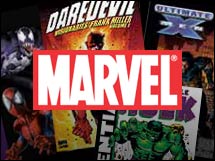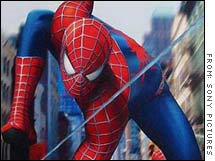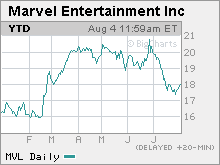|
Here comes the Spider-Man Comic book company Marvel should have a banner year in 2007, but some worry about its ambitious plans to start making its own movies. NEW YORK (CNNMoney.com) -- When comic book company Marvel Entertainment reported its second-quarter results Monday, it's safe to say that few cared about how Marvel actually did in the second quarter. Sure, Marvel beat analysts' earnings and sales expectations but profit and revenue were still lower than the same period last year. Everyone who follows the company closely knows that this would not be a good quarter (or year, for that matter) for Marvel. That's because Marvel generates the bulk of its sales and profits from licensing the rights to its characters for use in movies, television shows, video games and other merchandise. Marvel (Charts) has only one major movie tied to one of its comic book franchises this year, "X-Men: The Last Stand." Granted, "X-Men", released in May, has been a huge blockbuster for Marvel and News Corp's Fox, the studio that released the film. And even though Marvel raised its earnings target for 2006 on Monday, Wall Street still expects the company to report a revenue and profit decline for the whole year. But 2007 is expected to be a different story. Three movies based on Marvel's characters are due out next year, most notably "Spider-Man 3," which will be released next May. Yeah, it may seem too early for Wall Street to get excited about "Spider-Man 3" (although have you seen how cool Venom looks in the trailer?) but now actually is the time for investors to start paying attention to how much of a lift this movie will give to Marvel's sales and profits. "People are looking at the story for next year with 'Spider-Man 3' coming out. How could you not? That's where the growth is going to be," said Arvind Bhatia director of research with Sterne, Agee & Leach. 2007: Superheroic sales and profits? Marvel did not issue guidance for 2007, however. That may disappoint some who were hoping for a repeat performance of what the company did three years ago. When Marvel reported its second quarter results back in August 2003, the release of "Spider-Man 2" was still nine months away. But partly due to expectations about how well that movie would do, Marvel issued sales and profit guidance for all of 2004 that was higher than what Wall Street was expecting and Marvel's stock surged more than 15 percent on the news. Even though Marvel didn't raise guidance, Robert Routh, an analyst with Jefferies & Co., said it's clear that with "Spider-Man 3" coming out next year as well as a "Fantastic Four" sequel and a movie based on Marvel's "Ghost Rider" character, next year could be the company's most successful in its history. Analysts currently expect Marvel to report sales of $460.9 million in 2007 and earnings per share of $1.18. So if Routh is right about 2007 potentially being Marvel's best ever, then Wall Street estimates would appear to be way too low, particularly on the sales side. In 2004, Marvel reported revenue of $513.5 million and a profit of $1.04 per share. (Marvel's earnings peak was not 2004 though. The company posted earnings of $1.11 a share in 2005 even though sales fell.) Despite this, many on Wall Street are still wary of Marvel. The stock has fallen nearly 15 percent since late June. And there are some legitimate concerns. Could be a takeover target Some investors appear to be worried about recent management departures at Marvel. Avi Arad, who had been the head of Marvel's new studio unit, left in May to form his own movie production firm. And Marvel announced in mid-July that Tim Rothwell, its president of worldwide consumer products and Bruno Maglione, president of Marvel International, were both leaving and that their responsibilities would be handled by other Marvel senior executives. But Routh said that instead of worrying, Marvel investors might want to read between the lines. He speculates that maybe Rothwell and Maglione left because Marvel might be getting ready to shop itself to another larger media company. "These defections may point to something going on with the company that's bigger than people realize," Routh said. "The only reason you leave is if you have a position that's significantly better or if that something is going on where you wouldn't be needed." As such, Routh said that Marvel could be a good fit for Viacom (Charts), whose Paramount movie studio will distribute a film based on Marvel's "Iron Man" in 2008, News Corp (Charts)., which has produced all three X-Men movies and last year's "Fantastic Four," or Time Warner (Charts), which owns rival comic book publisher DC Comics. (Time Warner is also the parent company of CNNMoney.com) And each of these media giants has a lot more global marketing muscle than Marvel. "These bigger entities already have people doing licensing all over the world," Routh said. Evan Wilson, an analyst with Pacific Crest Securities, agreed that Marvel could be attractive to a larger media firm. "Marvel has inroads into a very difficult-to-reach demographic. Their movies are typically geared to 16-to 24-year-old males and that's a market that bigger media companies and advertisers are having a tough time reaching," Wilson said. Both Routh and Wilson also pointed out that Marvel has been aggressively buying back its own stock over the past few months and that this could be a possible signal of some sort of good news in the offing. Making its own films is a risk Bhatia isn't convinced that an imminent Marvel sale is in the works though. He points out that Arad, who filed to sell 3.15 million Marvel shares after his departure, probably would not have left if the company was about to be acquired. "Arad would have stayed around in my opinion if a sale was imminent since a sale would probably be at a premium to the stock's price," he said. Arad's departure leads to other concerns. With its in-house studio, Marvel is taking steps to produce its own films instead of having to rely on larger firms such as Fox or Sony (Charts), which produced the "Spider-Man" movies and is also the studio behind "Ghost Rider," to make them. While this could be extremely lucrative for Marvel, it also substantially adds to the financial risks for the company. To help ease some concerns, Marvel is holding a separate investor meeting next Thursday to talk about its studio business and some of that division's projects, which include "Iron Man", a new film adaptation of "The Incredible Hulk," and a movie based on "Ant-Man." "It is safe to say that this is the No. 1 thing are investors trying to get their hands around, the economics of the studio business," Wilson said. But Bhatia is concerned about the company's decision to make its own films since Arad, widely recognized as one of the top creative forces at Marvel, is no longer there to oversee the running of the studio. "I'm a little bit skeptical about the longer-term strategy, especially since Avi Arad has left," he said. Jefferies' Routh owns shares of Marvel but his firm has no banking relationship with the company. Other analysts quoted in this piece do not own Marvel and their firms have not done investment banking for the company. The reporter of this story owns shares of Time Warner through his company's 401(k) plan. -------------------------------------------------------------------------------- |
|





